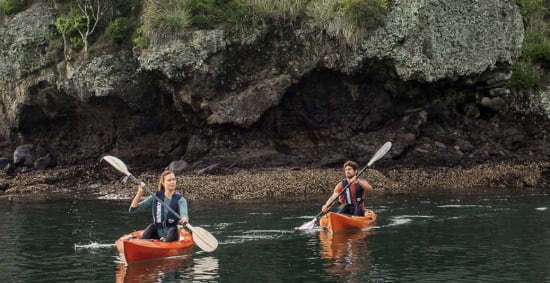
Economy
Bold, pioneering steps are needed to help the tourism industry recover from Covid lockdowns and cope with the impacts of climate change
Opinion: The past four years have seen exceptional alignment between the public and private sectors, recognizing the enormous challenges facing the tourism industry in Aotearoa and the need for urgent system-wide transformation.
It has also become clear that the required level of transformation cannot be achieved within the structure of our existing tourism system.
Bringing the public and private sectors together in a Tourism Commission could be the change needed to revive the industry in a post-Covid world.
It would primarily focus on safeguarding all the different parts of our tourism system – including the legislative framework and managing key relationships with the Department of Conservation, Waka Kotahi, local government and private sector investors such as hotels, airports and airlines who have invested huge amounts of capital in the industry – are highly aligned.
Industry leader and strategist Glenys Coughlan shared this idea at a University of Otago Tourism Policy School, which explored ways to reshape the tourism industry to promote transformational change.
The annual, two-day event was attended by industry leaders, policy makers and researchers to discuss key challenges and opportunities in the New Zealand tourism industry.
READ MORE:
* Tourists flock to the scenic south
* Ewe-topia or bust: Sunny visions of coming tourism
* Time to turn tourism into a long-term career
Coughlan noticed the Tourism Futures Task Force Interim Report (December 2020), ‘We are Aotearoa’was inspiring and ambitious, providing a strategic framework for transformation that was widely welcomed.
Tourism Minister Peeni Henare reiterated the urgent need to “break away from the large-scale tourism model we had in 2019 and refocus our tourism recovery on a more values-driven model”.
The tourism system in Aotearoa is designed to manage and market tourism, but is incapable of fostering the system-wide transformational change called for in this and other widely supported tourism ‘reset’ proposals.
“We need to accelerate the pace of change, and neither government nor industry can do that alone, nor can the required level of transformation be achieved within the existing tourism system,” Coughlan argued.
Transformational sector change has even turned out to be beyond the reach of individual ministries cooperating with key organisations.
We believe that a Tourism Commission – a new public-private partnership model that mirrors the successful cross-sectoral collaboration approach of the Tourism Futures Taskforce and Aotearoa Circle – is urgently needed.
The new entity, which could be modeled on the Infrastructure Commission, must involve public and private sectors, as neither can transform the tourism system alone.
A Tourism Commission would be tasked with shaping, aligning and facilitating the efforts and resources required to guide tourism development in a way that addresses the multi-layered and complex challenges increasingly facing our industry.
Transformation should also be reflected in Tourism New Zealand initiatives, which should seek to promote Aotearoa as a destination underpinned by principles of regenerative tourism and te ao Māori, and with a genuine commitment to promoting community well-being.
New Zealand is well positioned to demonstrate global leadership in transforming the tourism system. The unprecedented alignment of key stakeholders has confirmed the challenges we face and the need for urgent, system-wide change. This change will not only help address challenges, but also provide spillover opportunities and benefits to many other sectors, such as the technology and export economies.
Coughlan acknowledged that while the tourism industry is still in the early stages of recovering from the pandemic, we are now staring down the course of climate change.
This was supported by the IPCC’s recently released Sixth Assessment Report, which identifies the tourism and travel industry as one of the key sectors of the global economy highly vulnerable to the impacts of climate change.
The need for systemic change was echoed by other delegates at the Tourism Policy School event, when they discussed how much resources and effort have been invested in recent years in strategies to reshape the future of tourism in New Zealand.
Deputies also called on Aotearoa to actively promote forms of tourism that promote the prosperity and well-being of the community.
Tourism Minister Peeni Henare reiterated the urgent need to “break away from the large-scale tourism model we had in 2019 and refocus our tourism recovery on a more values-driven model”.
Transformation Plan for the Tourism Industry Environment Co-Chair Laurissa Cooney, who launched The Aotearoa Circle’s Tourism Climate Change Scenarios, predicted three possible futures for the tourism industry based on the country’s climate action.
All three scenarios emphasize the fact that we must collectively do everything we can to keep warming below 1.5°C.
The magnitude of the challenges we face in the future will be determined by how quickly and proactively we respond now.
There is too much risk, and too much to be gained, by thinking about the future of tourism without being equipped to drive and deliver the scale and scope of transformational change that will be required to rebuild our tourism system. to support.
But efforts to transform tourism to meet the challenges of the 21st century have so far been unsuccessful. Tourism is a disparate sector that includes many national and regional organizations, ministries, agencies and companies involved in the management and marketing of tourism.
So far, this diversity of actors has posed significant challenges to coordinated efforts to promote systemic change.
In the words of Coughlan, “It is no longer about a few pioneering initiatives by innovative operators or regions, it is time to change the whole game if tourism is to make a net positive contribution across all dimensions of well-being – environmental, economic, social . and cultural.”
